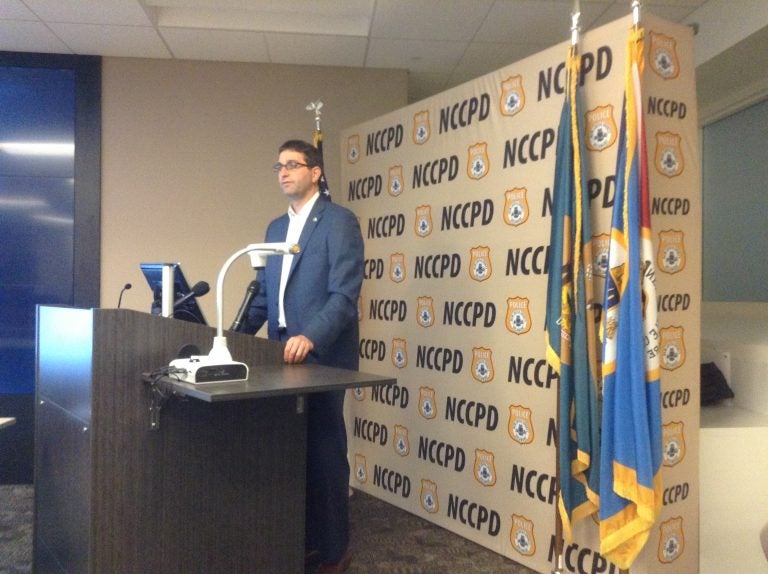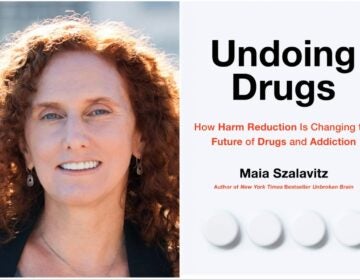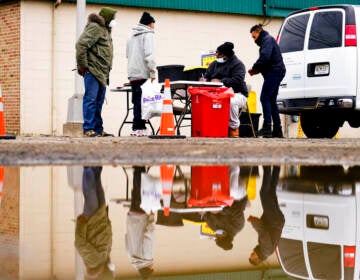New Castle County to hire addiction coordinator
The New Castle County Police Department will use new grant money to hire a coordinator for its addiction treatment program

Matt Meyer and New Castle County police announce a grant to combat opiate addiction. (WHYY/Zoe Read)
The New Castle County Police Department will use a $118,628 grant from the University of Baltimore to hire a coordinator for its “Hero Help” addiction treatment program as part of the effort to combat the heroin epidemic.
Launched in May 2016 by county police, the Delaware Department of Justice and the state Division of Substance Abuse and Mental Health, the program offers substance abuse treatment as an alternative to arrest.
“Opiate abuse and addiction is the public health crisis of our generation,” said County Executive Matt Meyer, D-New Castle.
“Every individual struggling with the disease of addiction makes a number of decisions about the direction in which they want their life to go. Today what we’re saying is we’re committing resources so they do not need to make that decision alone.”
So far this year, there have been 227 suspected overdose deaths in the state. Last year, there were 308 suspected overdose deaths—a 35 percent increase from the year before.
In 2014, county police launched the Property Crime Initiative in response to a high number of property crimes in the state. County police report while the majority of individuals struggling with addiction do not commit crimes, property crimes are often driven by those struggling with addiction.
In order to reduce crime and protect the public, the police department started the “Hero Help” program.
Officers arresting individuals for minor crimes like drug possession began offering suspects addiction treatment in lieu of arrest.
But the police department discovered individuals would still ask for help, even without arrest.
So far, 62 people have entered the program, and about 47 of them entered on their own will.
The police department is also opening up the program to suspects who may not agree to it upon arrest, but ask for help at a later date. Major Robert McLucus said it’s going to act as a “quasi-drug diversion program.”
“We currently have drug diversion programs in the court system. But the reality is for someone to get into that it takes weeks, sometimes months, to get into drug diversion. So what are they doing in that time frame? In all likelihood, still using, because no one’s addressing that substance abuse issue. If their means to support their habit was crime they’re probably still committing crime. So by allowing those people who were arrested when they had second thoughts and came back to us it does kind of work like a drug diversion,” he said.
“Those charges don’t necessarily go away, but if they adhere to the agreement in treatment and are successful we’ll make a favorable recommendation on their behalf.”
McLucus said the new funding allows the police department to hire a coordinator to conduct outreach, develop a support group to ensure continuous support for participants, initiate a program review and lead case management.
The coordinator, to be hired by January 2019, will have a background in substance abuse treatment and an understanding of law enforcement.
The funding also will pay for 150 kits of Narcan, the overdose-reversing drug, to be delivered to loved ones of individuals who have survived an overdose.
Amy Kevis of the Division of Substance Abuse and Mental Health said it’s important to expand the program because some treatment providers aren’t open 24/7.
“We often don’t have opportunity to engage people in treatment after hours, and this gives the opportunity to do that,” she said.
“Unfortunately, this epidemic has hit all of us at some point, whether through a family member or someone we know or love. Addiction doesn’t care who you are or where you come from—it affects all of us.”
WHYY is your source for fact-based, in-depth journalism and information. As a nonprofit organization, we rely on financial support from readers like you. Please give today.





